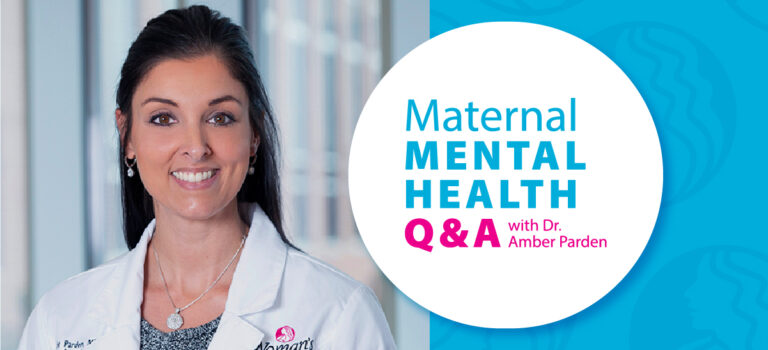Amber Parden, MD, is a double board-certified psychiatrist with a passion for perinatal mental health. Dr. Parden has been practicing at Woman’s Hospital since August 2020. She provides treatment for peripartum and postpartum symptoms that manifest as anxiety, depression, OCD, post-traumatic distress, and/ or psychosis. Her focus is on healing with the use of medication management and psychotherapy treatment plans. She also provides inpatient and outpatient consultations for mental health support, bariatric surgery patients, and those undergoing cancer treatments.
Dr. Parden shares insightful information about the importance of being aware of maternal mental health signs. Additionally, she wants women to know that “education is the key” and that there is an advantage to being self-aware. Dr. Parden hopes that through her responses, women will find comfort in knowing that they don’t have to walk through the journey of maternal mental health alone.
- Can you explain why being aware of maternal mental health is important?
Awareness is pertinent when considering the prevalence of mental health challenges concerning pregnancy and postpartum.
The World Health Organization (WHO) states, “1 in 5 women will experience a mental health condition during pregnancy or the year after the birth, and at least 20% of women diagnosed with perinatal mental health conditions will experience suicidal thoughts or undertake acts of self-harm.”
Treatment intervention will make a significant difference for years to come. Women who struggle with emotional difficulties during pregnancy and the infant period have a hard time meeting their own emotional needs and the needs of their children. This lack of connection can create lasting effects on the baby for the rest of their life, including adverse cognitive, behavioral, emotional, and neurophysiological deficits. I believe society lacks awareness of how crucial attachment in the first year of life is for a baby.
- How do you help mothers maintain their maternal mental health?
My approach recognizes that education is the key, allowing me to have more of a psychotherapeutic approach than other psychiatrists. My experiences have taught me that the value of self-awareness for mothers can change their outlook on the world and themselves. I help mothers strengthen and maintain relationships with their children and others they care about. The scariest thing about the postpartum experience is when there is a mental health decline, and it does not make sense to the mother. Helping a woman make sense of her experience is the first step to changing her story. Medication can be introduced when specifically helping some of these mothers manage their emotions when the intense emotional impact is so profound that it changes how they function and parent.
- What advice can you share with women who hope to be mothers, but may be hesitant due to the fears of postpartum depression?
First and foremost, I encourage putting yourself first. Self-care and self-compassion go a long way. My previous experience has been that even some women who do not suffer from depression have fears that they will not mother well. This fear plays out in their lives in many other ways before they have children. Women with fears about life changes, such as having children, should explore those fears and where they come from. These women may have a distorted view of themselves that they can work through challenges successfully. It is worth seeking help to change a negative belief system about yourself and the environment around you, whether or not you ever intend to have children. I encourage them to connect with their “Tribe”/ families for help when they have a support system. Lastly, I believe that telling yourself and others what you need as a human being allows growth and confidence to know that you deserve to be cared for and valued.
- What do you love most about working in women’s health (mental health) specifically?
I get the privilege of hearing these women’s stories, giving them hope, and being a part of their healing journey. Most of the patients I see are moms and I enjoy focusing on parenting skills and training. I do not have very much time to integrate this in practice, but it frequently shows up as one of the most significant factors in mental health issues that come up for moms. As a child and adolescent trained psychiatrist, treating and educating the mom feels like I’m treating the whole family, and it’s an amazing experience. My mantra for my work is that I’m “changing the world, one mom at a time”.

